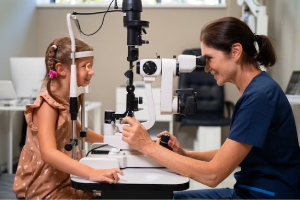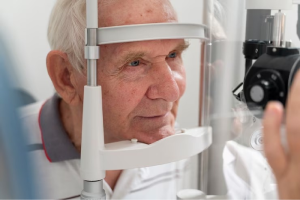Laser cataract surgery, also known as femtosecond laser-assisted cataract surgery, is a modern and advanced approach to cataract surgery. It incorporates the use of a laser to perform some of the key steps in the surgical process. While traditional cataract surgery is highly effective, laser cataract surgery offers certain additional benefits and precision.
Preoperative Imaging:
Before the surgery, detailed imaging of the eye is performed using advanced diagnostic tools. This information helps in creating a customized treatment plan.
Femtosecond Laser Application:
A femtosecond laser is used to create precise incisions in the cornea and the capsule that surrounds the natural lens.
Lens Fragmentation:
The laser is employed to break the cataract-affected lens into smaller, more manageable pieces. This step is similar to the traditional phacoemulsification technique but uses the laser for added precision.
Astigmatism Correction:
The laser can also be utilized to make precise incisions to correct astigmatism if needed. This may reduce the dependence on glasses for distance vision after the surgery.
Intraocular Lens (IOL) Placement:
After the laser has prepared the eye, the surgeon proceeds with the placement of the artificial intraocular lens (IOL) to replace the natural lens.
Postoperative Care:
The postoperative care and recovery process are similar to traditional cataract surgery. Patients may be prescribed eye drops to prevent infection and control inflammation.



Laser cataract surgery offers several potential benefits compared to traditional cataract surgery, although it’s important to note that the effectiveness of the procedure can depend on various factors, including the surgeon’s expertise and the patient’s individual characteristics. Here are some potential benefits of laser cataract surgery:
Enhanced Precision:
Laser technology allows for highly precise incisions, creating a more accurate opening in the cornea and the capsule that surrounds the natural lens. This precision may contribute to improved visual outcomes.
Customization:
Preoperative imaging enables the surgeon to create a personalized treatment plan based on the unique characteristics of each patient’s eye. This customization can enhance the overall surgical experience and potentially improve visual outcomes.
Reduced Energy Use:
In traditional cataract surgery, ultrasound energy is used to break up the cataract-affected lens for removal. Laser cataract surgery may reduce the amount of ultrasound energy needed, potentially leading to a gentler procedure and a quicker recovery.
Astigmatism Correction:
Laser cataract surgery can be used to make precise incisions to correct astigmatism. This may reduce the need for glasses or contact lenses after the surgery for distance vision.
Improved Capsulotomy:
The laser can create a more precise and consistently shaped opening in the lens capsule (capsulotomy), which can be important for the accurate placement of the intraocular lens (IOL). This can contribute to better visual outcomes.
Reduced Need for Blades:
Laser cataract surgery involves fewer manual incisions with blades, as some of the incisions are made by the laser. This may reduce the risk of human error and enhance the safety of the procedure.
Potential for Less Postoperative Astigmatism:
The laser’s ability to precisely correct astigmatism may result in less postoperative astigmatism, potentially improving overall visual quality.
laser cataract surgery from Mr Deshmukh offers patients the advantage of cutting-edge technology, personalized care, superior outcomes, and a reduced risk of complications, ultimately leading to enhanced visual clarity and improved quality of life post-surgery.
Precision and Accuracy: Laser cataract surgery performed by Mr Deshmukh utilizes cutting-edge laser technology, ensuring remarkable precision and accuracy during the procedure. This advanced technology allows for customized incisions and precise lens fragmentation, enhancing surgical outcomes.
Customized Treatment:Mr Deshmukh tailors laser cataract surgery to each patient’s unique eye anatomy and specific cataract condition. The precise customization offered by laser technology results in optimized visual outcomes and reduced likelihood of astigmatism.
Enhanced Safety: Laser cataract surgery, under the expertise of Mr Deshmukh, offers an added layer of safety. The laser’s accuracy minimizes risks associated with traditional surgical methods, promoting a safer surgical experience for patients.
Faster Recovery: Patients undergoing laser cataract surgery by Mr Deshmukh often experience quicker recovery times. The precision of laser technology leads to gentler tissue handling, reducing inflammation and promoting a speedier healing process.
Reduced Dependence on Glasses: Laser-assisted techniques allow for more accurate placement of intraocular lenses (IOLs). This precision enhances visual outcomes, potentially reducing the need for corrective eyewear post-surgery.
Expertise and Experience: Mr Deshmukh is a highly skilled ophthalmologist with extensive experience in laser cataract surgery. His proficiency in utilizing advanced laser technology ensures optimal surgical results and patient satisfaction.
State-of-the-Art Facilities: Mr Deshmukh’s clinic in the UK is equipped with state-of-the-art facilities, including the latest laser technology and modern amenities necessary for performing advanced cataract surgeries with utmost precision and safety.
Laser cataract surgery is a widely used and effective procedure, but eligibility can depend on various factors, including the patient’s overall eye health and specific conditions. While laser cataract surgery offers benefits, not everyone may be a candidate, and the final decision is often made after a comprehensive eye examination by an ophthalmologist. Eligibility criteria may include:
Severity of Cataracts:
Laser cataract surgery is typically recommended for individuals with significant cataracts that are affecting their vision and daily activities. The extent of cataract development is an essential factor in determining eligibility.
Overall Eye Health:
The general health of the eye, including the cornea and retina, is considered. Certain eye conditions or diseases may impact the feasibility and success of laser cataract surgery.
Astigmatism Correction:
Patients with astigmatism may benefit from laser cataract surgery, as the laser can be used to make precise incisions to correct astigmatism. This can reduce the dependence on glasses or contact lenses for distance vision.
Corneal Conditions:
Patients with certain corneal conditions may benefit from laser cataract surgery, as the laser can assist in creating precise incisions. However, the surgeon will assess whether the cornea is suitable for the procedure.
Preoperative Imaging:
Preoperative imaging and diagnostics help the surgeon plan the procedure and evaluate the patient’s unique eye characteristics. This information may influence the decision on whether laser cataract surgery is the most appropriate option.
Patient Preferences:
Some patients may have specific preferences, such as a desire for reduced dependence on glasses or a preference for advanced technology. These factors can be considered in the decision-making process.
Insurance Coverage:
The availability of insurance coverage or willingness to cover the cost of laser cataract surgery may also influence eligibility. Some insurance plans may cover the basic cataract surgery procedure but not the additional cost associated with laser technology.
1. What is laser cataract surgery, and how does it differ from traditional cataract surgery?
Laser cataract surgery is an advanced technique that utilizes laser technology for precise incisions and lens fragmentation. Unlike traditional surgery, lasers are used to perform certain steps, enhancing accuracy and potentially improving outcomes.
2. Is laser cataract surgery safe, and are there any specific risks associated with this procedure?
Laser cataract surgery is considered safe and offers added precision. Mr Deshmukh discusses potential risks, but generally, the procedure has fewer risks compared to traditional methods, with an emphasis on patient safety.
3. What are the advantages of choosing laser cataract surgery performed by Mr Deshmukh ?
Laser cataract surgery with Mr Deshmukh offers advantages such as enhanced precision, customized treatment, quicker recovery times, potentially reduced dependence on glasses, and superior visual outcomes.
4. How long does it take to recover from laser cataract surgery, and what can patients expect during the recovery period?
Recovery time after laser cataract surgery is generally quick. Patients may experience improved vision within days to weeks. Mild discomfort or irritation might occur initially but resolves as the eye heals.
5. Will insurance cover laser cataract surgery by Mr Deshmukh, or are there flexible payment options available?
Mr Deshmukh clinic may accept various insurance plans for cataract surgery. Patients can inquire about insurance coverage details or explore flexible payment options and financing plans that may be available for the procedure.










